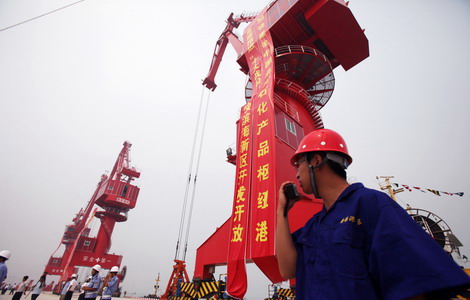Rotterdam in negotiations to form JV in Tianjin
Updated: 2011-11-09 14:50
By Zhou Siyu (China Daily)
|
|||||||||||
|
Nangang port in Tianjin. A proposed joint venture with the Port of Rotterdam Authority is at an initial stage and must receive government approval before it can proceed, said the Dutch firm. [Photo/ China Daily] |
BO'AO, Hainan - Rotterdam, the largest port in Europe measured by throughput, plans to form a joint venture with a company in the Tianjin Economic-Technological Development Area to provide management services for the Nangang port, said Hans Smits, president and chief executive officer of the Port of Rotterdam Authority.
The proposal is at an initial stage and has yet to receive government approval before it can proceed. If it comes to fruition, it will be the first time that a European port has invested in China, according to the Rotterdam team.
"China is a very important market for us, and we intend to expand investments step by step," said Smits in an exclusive interview.
He said a new oil terminal in Rotterdam port, which is still under construction, has drawn interest from Chinese petrochemical and oil companies.
The terminal will allow companies to get oil from Russia and distribute it to China and other countries with a high demand for the commodity, Smits said, declining to disclose the companies' names.
"We expect more Chinese investment in Rotterdam port in the next few years," he added.
In 2009, the Dutch port surpassed Hamburg to become the European port handling the largest amount of container cargo transported between China and Europe.
One-third of the container cargo that now goes through it is being transported to or from China, and that figure is expected to increase, according to the port.
At a time when the developed economies are struggling with debt concerns and high rates of unemployment and emerging markets are battling inflation, the global economy is going through a difficult recovery period. The maritime industry has been one of the first industries to show signs of the impending troubles.
In Rotterdam port, the cargo volume during the first nine months of the year increased by 1.7 percent above what it had been a year ago, reaching 317 million tons, according to the port. Container throughput, meanwhile, increased by 11 percent during the first three quarters of the year, bringing the total weight of the cargo handled to 93 million tons.
"We had a good third quarter and are very careful about the fourth quarter," Smits said. "We expect to see full-year growth, but there is a slowdown in container throughput growth in the fourth quarter, as the world economy is cooling.
"We expect to see a strong impact (from the debt crisis) in the coming years, when the European economy will maintain a modest annual increase of 1 percent to 2 percent."
Hou Yunchun, vice-director of the Development Research Center of the State Council, said that it may take a "relatively long" time for the world economy to recover.
"The world economy needs time to go through a deep restructuring," he said. "This period will be marked by low economic growth and the development of emerging industries."
But China's economic growth is still expected to maintain its momentum, even though the country is exporting less, Hou said.
"China's economic growth will be led by demand next year," he said. "Domestic consumption is likely to increase. The growth in foreign investment and exports will remain strong, despite a slowdown in the growth rate."
From January to September, the value of China's exports increased by 22.7 percent more than a year ago, rising to $1.39 trillion, according to data from the Ministry of Commerce. That growth rate trailed the rate for the same period over the past year by 11.3 percentage points, the ministry reported.
Meanwhile, the same period saw the value of the country's imports increased by 26.7 percent, reaching $1.29 trillion. The rate of growth trailed the rate for the past year by 15.7 percentage points, according to the ministry's data.









